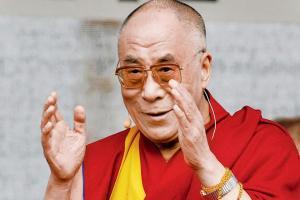One mighty fine way of getting the government to abandon its all-India plan to enforce NRC is to voluntarily seek detention, which upholds the country's tradition of compassion and non-violence

"The enemy who creates trouble for you is the best teacher," the Dalai Lama quoted Shantideva, an eighth century Buddhist monk, to analyse The Eight Verses on Training the Mind, which was written by Geshe Langri Tangpa (1054-1123 CE)
 On November 20, the day Home Minister Amit Shah announced a countrywide National Register of Citizens, the Dalai Lama spoke on the subject of Overcoming Anger and Anxiety at St Columba's School, Delhi. He did not discuss citizenship or matters political, but his discourse hooked me for its allusion to what ought to be the most suitable response of humans to an utterly oppressive condition, which an all-India exercise to implement the NRC will create for the poor, particularly those who are Muslim.
On November 20, the day Home Minister Amit Shah announced a countrywide National Register of Citizens, the Dalai Lama spoke on the subject of Overcoming Anger and Anxiety at St Columba's School, Delhi. He did not discuss citizenship or matters political, but his discourse hooked me for its allusion to what ought to be the most suitable response of humans to an utterly oppressive condition, which an all-India exercise to implement the NRC will create for the poor, particularly those who are Muslim.
ADVERTISEMENT
"The enemy who creates trouble for you is the best teacher," the Dalai Lama quoted Shantideva, an eighth century Buddhist monk, to analyse The Eight Verses on Training the Mind, which was written by Geshe Langri Tangpa (1054-1123 CE). The Dalai Lama read the fifth of the eight verses: "When others, out of jealousy/Treat me wrongly with abuse, slander, and scorn/May I take upon myself the defeat/And offer to others the victory."
In his exposition, the Dalai Lama reminisced about the suppression of Tibetan protests, in 2008, by the Chinese. He said, "I visualised some of the Chinese officials who had made the decision. I took upon their anger, their fear, to myself and gave them forgiveness, tolerance and compassion." To what avail? The Dalai Lama answered: "It was [of] no help to the situation, but it gave immense peace of mind [to me]."
The fear of the oppressed goads the oppressor into adopting heartless policies. Victory is voluntarily offered to the oppressor to dispel his unfounded fear, reform him and, therefore, alter the social condition. The oppressed breaks the circle of suffering as he or she does not resist oppression through violent methods.
However, the offer of defeat could turn the powerful into a habitual oppressor. In his commentary on The Eight Verses, Geshe Sonam Rinchen (1933-2013) writes, "If offering the victory and giving the other person satisfaction would lead to greater harm in the long run… it would be a mistake to give in."
Over the last six years, Muslims have offered victory, in the Buddhist sense of the term, to the Sangh Parivar, silently enduring injustices. They did not protest against the Supreme Court's flawed Ayodhya judgment. Even the decision to seek a review of the judgment might not have been taken had the Sangh announced a closure to all disputes over places of worship. The patience of Muslims, however, has whetted the Sangh's appetite for victories, evident from Shah making his NRC statement so soon after the judgment.
The NRC is an instrument of torment for Muslims. This is palpable from the Assam government's decision to reject the final NRC list for the State, dismayed as it was that the Bengali Hindus, not Muslims, dominated the list of 19.6 lakh people who were excluded from the NRC. The rejection mocks the poor who endured tremendous hardship to procure documents to establish that they or their ancestors were residents of Assam before March 25, 1971.
BJP leader Himanta Biswa Sarma argues that March 25, 1971, should also be the cut-off date for the all-India NRC for determining citizenship, as illegal immigrants could have fanned out from Assam to other states. His suggestion infracts the Constitution, which provides citizenship to all those born in India until July 1, 1987; and after that date, to those whose one parent was an Indian citizen. An amendment to the Citizenship Act, 1955, however, denies citizenship to anyone born after December 3, 2004, if one of his or her parents was an illegal immigrant.
Logically, the citizenship of those born before July 1, 1987, is beyond the pale. The all-India NRC should, therefore, have two cut-off dates – for those born between 1987 and 2004, and then thereafter. This means that 50-60 crore Indians will have to prove their citizenship. Among them, the poor among Muslims, often without documents, who will reap the bitter harvest of becoming stateless.
This is because the government plans to enact the Citizenship Amendment Bill, which prohibits detention and deportation of non-Muslim illegal immigrants from Bangladesh, Pakistan and Afghanistan. Given the implausibility of detaining lakhs declared stateless or any country accepting them, there is the grim possibility of their disenfranchisement, as was prescribed for 10 years for illegal immigrants who came into Assam between January 1, 1966, and March 25, 1971.
The writer is a senior journalist
Send your feedback to mailbag@mid-day.com
The views expressed in this column are the individual's and don't represent those of the paper
Catch up on all the latest Crime, National, International and Hatke news here. Also download the new mid-day Android and iOS apps to get latest updates
 Subscribe today by clicking the link and stay updated with the latest news!" Click here!
Subscribe today by clicking the link and stay updated with the latest news!" Click here!






